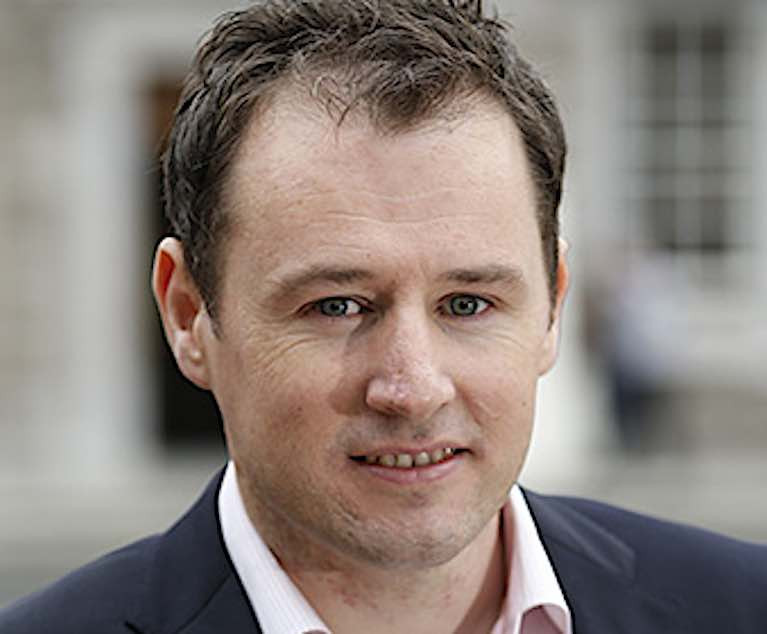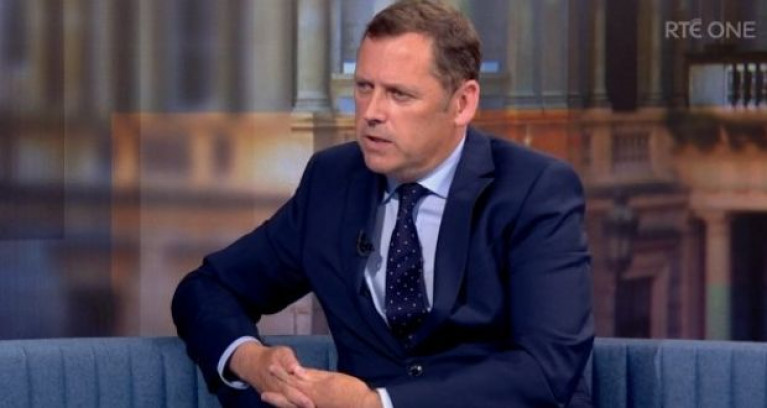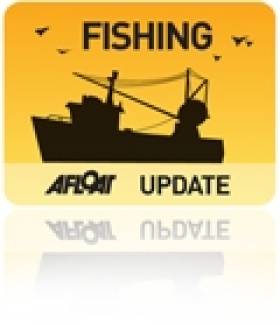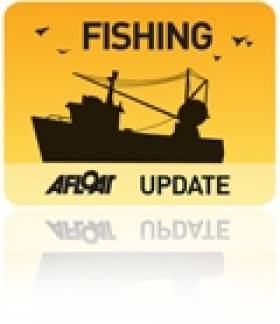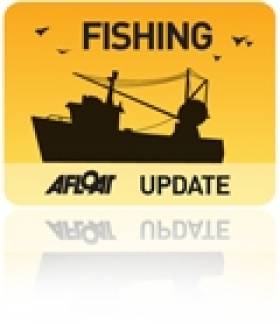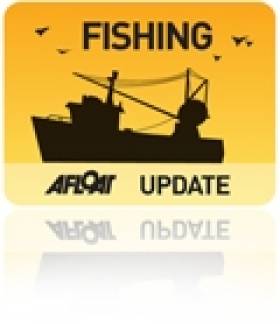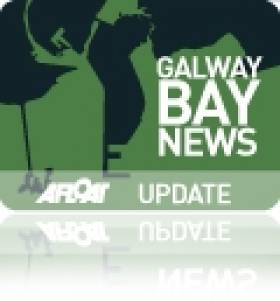Displaying items by tag: Marine Minister
New Marine Minister to Meet Fishing Industry Over Penalty Points
Micheál Martin and new marine minister Charlie McConalogue are expected to meet fishing industry representatives over the Government’s controversial re-introduction of a penalty points system to regulate commercial fishing.
The meeting has not yet been confirmed by Government, but KFO chief executive Seán O’Donoghue said he understood that both Mr Martin and Mr McConalogue were due to meet industry representatives in “the very near future”.
The Donegal TD, who this week became Mr Martin’s third appointee to the agriculture, food and marine brief in two months, is on record as stating that the “needs of the fishing sector” should be taken into account in relation to penalty points.
Penalty points as administrative sanctions for fishing offences have been sought by the EU as part of the Common Fisheries Policy.
The industry says it does not oppose it in principle, but is seeking a system which allows for adequate appeal.
“The existing one was thrown out by the courts on the basis that it did not allow for a right of appeal, except through a court of law, and penalties could still remain on a license if the case is thrown out,” Mr O’Donoghue explained.
Thread for the attention of @MichealMartinTD ??
— Pádraig Mac Lochlainn TD (@PadraigMacL) August 30, 2020
Here is what Fianna Fáil TDs had to say about the penalty points system for our fishers around the coast that you voted AGAINST in 2018 and then introduced last week
“The new Programme for Government had said any new system must be fair, and we took that to mean there would be more consultation,” he said.
Mr O’Donoghue said he believed Mr Martin was not fully aware of the legislation he was approving late last week during an “interregnum period” when he was acting marine minister.
“His two previous ministers – Barry Cowen and Dara Calleary - were both aware that there needed to be more consultation,” Mr O’Donoghue said.
Mr McConalogue was appointed to the agriculture, food and marine brief this week to replace Mr Calleary, who resigned after The Irish Examiner reported that he was one of 81 people who attended an Oireachtas Golf Society dinner in Clifden, Co Galway last month.
Mr McConalogue’s Dáil statement on penalty points two years ago was quoted earlier this week by Sinn Féin marine spokesman Padraig McLochlainn in a Twitter thread for the Taoiseach’s attention.
Speaking on a Fianna Fáil private members’ motion to annul the existing system – which was carried on May 29th, 2018 – Mr McConalogue had said that the Department of Agriculture, Food and Marine’s “track record in introducing a penalty-points regime has been poor”.
Other EU member states afforded the option to challenge the imposition of points “using lesser forms of proof”, but Irish fishermen were being denied this in this system, Mr O’Donoghue said.
The Government said earlier this week that fishermen who remain within the law have nothing to fear.
Newly appointed marine minister Barry Cowen has said he regrets an incident where he was disqualified from driving four years ago after being breathalysed.
The Fianna Fáil TD for Laois-Offaly and brother of former Taoiseach Brian Cowen, who was appointed to the marine and agriculture portfolio in the new government, described his disqualification for drink-driving as a "terribly stupid mistake".
He was speaking on RTÉ’s The Week on Politics after media reports about his disqualification, and the fact that his party leader, Taoiseach Micheál Martin, had not known about the incident until after his appointment.
Mr Cowen said he was humiliated and embarrassed by what had happened, and had to accept responsibility for a "serious lapse of judgement".
Mr Cowen was stopped at a road checkpoint and breathalysed on his way home from Dublin after the All-Ireland football final in September 2016.
He was found to be over the limit and was issued with a fixed charge penalty notice, a €200 fine, and was disqualified from driving for three months. He was on a provisional driving license at the time.
Mr Martin said he only found out about the incident on Friday and was disappointed that he had not been told about it by Mr Cowen before then.
Mr Cowen conceded that "maybe" he should have told his party leader about his disqualification, and said he had previously supported legislation on drink-driving.
He said that "maybe" he should have stood up in the Dáil or Irish parliament and "led from the front on this issue and acknowledged (his) terrible mistake".
Ireland’s Minister for Climate Action, Communication Networks and Transport Eamon Ryan, who is leader of the Green Party which has formed a three-way coalition government with Fianna Fáil and Fine Gael, said Mr Cowen had apologised to his colleagues.
Mr Ryan said there was a lesson to be learned that nobody was exempt from the law.
Coveney Blasts Iceland's 'Irresponsible' Mackerel Quota
#Fishing - Mackerel quotas will be the focus of discussions among European fisheries ministers in Brussels today as Ireland seeks a reduction of Iceland's share.
As RTÉ News reports, Marine Minister Simon Coveney will seek "strong and decisive action" against Iceland and the Faroe Islands unless the European Commission reports progress in talks over the realignment of mackerel catch limits.
Iceland's quota for mackerel increased from 2,000 tonnes in 2009 to a whopping 146,000 tonnes just two years later as stocks of the staple fish soared - partly due to migration from more southerly European waters.
But Minister Coveney has blasted Iceland's move as "irresponsible and unacceptable fishing".
The talks come in the wake of fruitful reform of the Common Fisheries Policy led by the minister as president of the EU Fisheries Council during Ireland's EU Presidency in the first half of this year.
CFP Reform Reaches Final Hurdle In Brussels
#CFP - RTÉ News reports that the "final battle" before reform of the Common Fisheries Policy (CFP) comes up today as a European Parliament committee votes on the changes led by the Irish Presidency of the EU in the first half of this year.
As previously reported on Afloat.ie, Europe's fisheries ministers agreed in May to a new policy that sets quotas based on scientific advice, with the aim of achieving healthy fish stocks and ultimately higher quotas as stocks are managed sustainably.
The reforms were pushed by Marine Minister Simon Coveney during his presidency of the EU Fisheries Council. The minister also made as his priority the ending of the practice of fish discards, a subject of much public outcry following revelations that as much as 50% of the catch in the North Sea is thrown back dead in the water.
Meanwhile, Ireland's additional quotas under the Hague Preferences have also been retained, a move that comes as some relief to the Irish fishing industry - which will also benefit from CFP amendments that would support the renewal of older fishing fleets.
However, conservation groups fear that these proposals would see the EU's fishing fleets grow to a size that far exceeds the available fisheries resource in European waters.
#FishFarm - The Galway Bay fish farm debate rolls on as Ireland's Marine Minister says there will be no damage to the environment or wild fish stocks.
Simon Coveney was speaking to Galway Bay FM last week on Bord Iascaigh Mhara's (BIM) proposals for a deep sea salmon farm off the Aran Islands.
The 500-hectare scheme would be the largest of its kind in Europe and has the potential to create hundreds of jobs in the region. A decision on BIM's licence application for the development is set to be made in the coming months.
But the plans have been opposed by conservationists, local anglers and the even the State fisheries body.
Last Wednesday 22 May, Inland Fisheries Ireland (IFI) published an FAQ on its concerns regarding the Galway Bay fish farm proposal, its own submission regarding the environmental impact statements attached to the licence application, and its reasons for avoiding a public debate on the issue.
"IFI is satisfied that its submission, which is supported by international scientific studies, clearly sets out its concerns and recommended measures for mitigation," it says.
Fish Discards Should End 'Within Six Years' Says Coveney
#CFP - The deal reached between EU fisheries ministers this morning on reform of the Common Fisheries Policy (CFP) should bring an end to the practice of fish discards within the next six years, according to Ireland's Marine Minister.
As reported earlier today on Afloat.ie, Minister Simon Coveney emerged from 36 hours of talks in Brussels confident that a far-reaching reform on fisheries policy had been reached.
RTÉ News reports that the compromise deal will see a 93% ban on discards take immediate effect, phasing towards a full ban by 2019, with special allowances made in certain cases where sustainability of fish stocks allows.
Minister Coveney, as president of the EU Council of Fisheries Ministers during Ireland's EU presidency, will submit the agreed reforms to the European Parliament - which has previously been steadfast in its demands for a complete ban on fish discards to halt the depletion of fish stocks in European waters.
As previously reported on Afloat.ie, this week's discussions on fisheries reform in Brussels have been described as a "once-in-a-decade opportunity" to end the wasteful practice of fish discards, which has seen as much as 50% of the catch in the North Sea is thrown back overboard dead.
#Fishing - Marine Minister Simon Coveney will present a revised comprehensive compromise Irish EU presidency text to the EU Council of Fisheries Ministers on Monday 13 May seeking a new mandate to re-enter final negotiations with the European Parliament on a reformed Common Fisheries Policy (CFP).
Minister Coveney said that these decisive negotiations for agreeing a comprehensive reform of the CFP in Brussels on 13-14 May are likely to be very difficult given the significance for the next decade of what may be decided at the meeting.
“An enormous amount of work has gone into progressing the reform with council, commission and parliament during the Irish presidency," he said. "We now have an Irish presidency substantially revised set of compromise proposals which I believe give us a sound basis for positive engagement at council.
"Agreement at council on this presidency compromise package would support an ambitious reformed CFP which would secure a better future for our fish stocks and for the fishermen and coastal communities who depend on them."
The minister emphasised that there is a "very short window of opportunity for council and parliament to agree and deliver an effective reform of our fisheries policy and the Irish presidency is doing all it can to bring the institutions together to take this historic opportunity.
"I believe that if all parties focus on the critical elements of a reformed CFP, we can by working together reach realistic and substantial agreement through the co-decision process during the Irish presidency.”
Formal negotiations with the European Parliament have resulted in the Irish presidency drawing up a revised compromise 200-page legal text, which Minister Coveney, as president of the council, will use as the basis of negotiations with EU fisheries ministers.
The objective is to get political agreement on a final compromise package to enable conclusion of negotiations with the parliament and the commission on CFP reform during the Irish presidency, which concludes at the end of June.
Minister Coveney will also update EU ministerial colleagues on progress made to date by the Irish presidency during the ‘trilogue’ process where EU presidency (council), commission and parliament have been engaged in complex discussions on refining proposals for CFP reform.
Groups Urge Fisheries Ministers For Action On CFP
#CFPreform - RTÉ News reports that up to 200 conservation groups in Ireland and abroad have written to Marine Minister Simon Coveney and his EU counterparts urging his support for an end to overfishing in European waters by 2015.
The groups claim that mismanagement of EU fisheries under the Common Fisheries Policy has resulted in significant overfishing, particularly in the Mediterranean where as much as 80% of fish stocks are fished far beyond sustainable levels.
As previously reported on Afloat.ie, Minister Coveney - who is President of the European Council of Fisheries Ministers - welcomed a vote in February on a reform agenda for the CFP, which has been prioritised for delivery by the Irish EU presidency before the six-month term concludes at the end of June.
#Marine - 'Foods of marine origin' are covered by the new call for research proposals under the Government's funding programmes, as announced by Marine Minister Simon Coveney on Tuesday.
In addition, the minister announced his intention to co-fund projects related to the marine sector with the Marine Institute.
Minister Coveney said that "co-funding arrangements between research funders, where appropriate, are logical in the context of the National Research Prioritisation process and, in this instance, it makes perfect sense for my department and the Marine Institute to come together to fund research relating to marine origin foods”.
The new call for research proposals, in general, aims to build and maintain research capability in the Irish public research system, which contributes to underpinning the sustainability and competitiveness of the Irish agri-food, forestry and fisheries sectors and the achievement of growth targets set out in the Food Harvest 2020 plan.
Apart from the marine food sector, areas covered by the call include animal and crop production, food and health, forestry, the wider bio-economy as well as the safety, quality, integrity and sustainability of the supply chain.
Minister Coveney added: “I have no doubt that the research community will take full advantage of this opportunity by submitting excellent proposals and I look forward to following the process over the coming months.”
The deadline for proposal applications is Tuesday 7 May at 1pm. All documentation in relation to the call for proposals is available on the Research Section of the Department of Agriculture, Food and Marine website.
#FishFarm - The Government 'will follow procedure to the letter' regarding the proposed €100-million deep sea fish farm for Galway Bay.
That was the message from Marine Minister Simon Coveney in the Dáil last week, as reported by Galway Bay FM, after it emerged that more than 400 submissions on plans for the State's largest ever aquaculture scheme were made to the his department.
The Dáil discussions came just days after a public protest against the fish farm plans in Galway - and some months after the National Inland Fisheries Forum lambasted as "flawed" the consent process regarding the proposed development.
Some 2,000 people amassed in opposition to the 500-hectare organic salmon farm off the Aran Islands proposed by Bord Iascaigh Mhara (BIM), which if it gets the go-ahead would be the largest facility of its type in Europe and would double the State's production rate of organic salmon - one of Ireland's most profitable export foodstuffs.
BIM has previously accused environmental campaigners of being "deliberately alarmist" about the fish farm, despite concerns raised my Inland Fisheries Ireland over the potential impact of sea lice infestations on wild salmon in the bay.
Meanwhile, in a letter to the Galway Advertiser last week, Attymon resident Gabe Cronolly criticises a BIM leaflet informing the public of its proposals.
"The leaflet states that sea lice can only be held responsible for one per cent of salmon losses at sea, but fail to report that 39 per cent of mortalities in fish farms are attributed to sea lice," he writes.



























